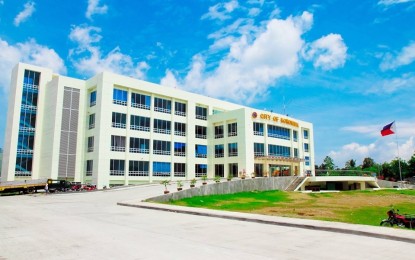
The city hall building of Koronadal (File photo courtesy of the city government)
KORONADAL CITY – The entire city will be placed anew under the more stringent general community quarantine (GCQ) for 15 days effective Friday night in the wake of the recorded clustering and increasing locally transmitted coronavirus disease 2019 (Covid-19) cases.
City Mayor Eliordo Ogena said the move was in response to recommendations from various sectors, among them the local medical community, for the immediate implementation of firmer control measures to contain the further spread of the disease.
The South Cotabato Medical Society and the city council specifically sought the declaration of a hard lockdown or enhanced community quarantine (ECQ) for at least two weeks to limit the movement of people and slow down the transmission of the virus.
In reverting to GCQ, Ogena said they considered the sentiments of sectors that could be heavily affected by another total lockdown, among them tricycle drivers, street vendors and other micro-scale traders, and local workers.
“This is a measure of compromise, short of a (total) lockdown, to balance the need to keep our economy running even as we continue to address this pandemic,” he said in a press conference late Thursday afternoon.
The stricter GCQ, as set under Executive Order (EO) 86 issued by Ogena on Thursday afternoon, will fully take effect and replace the prevailing modified GCQ measures starting at 8:30 p.m. on September 11 until September 25.
It restored the clustering of the city’s 26 barangays, the use of color-coded movement pass for residents, and the “no movement on Sunday policy.”
The movement of residents is generally restricted, except for essential workers and authorized persons outside the residence.
Persons less than 21-years-old and 60-years-old and above are “required to remain in their residences at all times.”
The EO said only two people per household are allowed to go out of their residence to access essential goods, subject to clustering policy, and for work in offices and industries permitted to operate.
Businesses and industries, except for hotels and other accommodation establishments, are allowed to operate while the holding of mass gatherings, such as sports events, movie screenings, concerts, entertainment activities, community assemblies, and other non-essential work gatherings are prohibited.
The suspension of religious activities is “strongly encouraged” and related gatherings are restricted to not more than 10 people under GCQ regulations, it said.
During the GCQ, Ogena said strategic lockdowns and containment measures may be implemented in areas that will have confirmed Covid-19 cases.
He said such an option is consistent with the Department of the Interior and Local Government’s recommendation to spare larger areas from hard lockdowns by focusing on the suspected and confirmed cases, and “let the economy operate.”
Ogena said the city government would strictly enforce compliance with health protocols, especially the wearing of face mask and face shield, as well as the observance of strict physical distancing in public places and establishments.
“The restriction on unnecessary movements should be properly observed,” he said.
Ogena said the City Health Office and its partners would continue with the massive contact tracing activities, as well as the isolation and testing of all suspected cases.
As of Thursday night, the South Cotabato Integrated Provincial Health Office said the confirmed infections in the city already reached 85, with 17 recoveries.
The recorded cases increased by 372 percent in just 11 days from 18 last August 31 to 67 as of September 10.
A total of 62 active patients are under close observation in isolation facilities while six are confined in undisclosed hospitals.
At least 27 cases involved fish vendors who had a history of exposure in the past two weeks at the General Santos City fish port complex, which is considered as a Covid-19 “hotspot”. (PNA)
